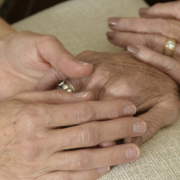Understanding Thyroid Health and Why It Matters as We Age
The thyroid may be small, but it plays a big role in how the body works every day. This butterfly-shaped gland at the base of the neck helps regulate metabolism, energy levels, heart rate, and even mood. During Thyroid Awareness Month, it’s a good time to talk about how thyroid health affects overall wellness, especially for older adults. As we age, thyroid conditions become more common and can be harder to spot because symptoms are often mistaken for “just getting older” or for other health issues.
Common Thyroid Conditions
Two of the most common thyroid disorders include:
Hypothyroidism (Underactive Thyroid)
This occurs when the thyroid does not produce enough hormones. Symptoms may include:
- Fatigue or low energy
- Weight gain
- Sensitivity to cold
- Depression
- Slower heart rate
Hyperthyroidism (Overactive Thyroid)
This happens when the thyroid produces too much hormone. Symptoms may include:
- Unexplained weight loss
- Anxiety or nervousness
- Rapid or irregular heartbeat
- Trouble sleeping
- Feeling overheated
Both conditions are treatable, but they often go undiagnosed without proper evaluation.
Why Thyroid Health Is Especially Important for Seniors
In older adults, thyroid problems can affect more than just energy levels. When left untreated, they may contribute to:
- Increased fall risk due to weakness or balance changes
- Heart rhythm problems
- Changes in mood or thinking
- Difficulty managing other chronic conditions
Because symptoms can be subtle, regular checkups and open communication with healthcare providers are essential.
Supporting Thyroid Health at Home
Managing a thyroid condition often involves routine lab work, taking medications correctly, and paying attention to how the body feels. For many seniors, this can feel overwhelming, especially when combined with other health needs.
That’s where support at home can make a difference.
How VitalCaring Can Help
At VitalCaring, our home health teams support patients living with thyroid conditions by focusing on safety, education, and overall quality of life. Our care may include:
- Helping patients stay on track with prescribed medications
- Monitoring for changes in energy levels, heart rate, or overall health
- Supporting nutrition and healthy daily routines
- Reducing fall risks related to fatigue or weakness
- Educating patients and caregivers on what changes to watch for
By providing care in the comfort of home, we help patients feel supported while giving families peace of mind.
A Thoughtful Approach to Ongoing Wellness
Thyroid health is just one piece of the wellness puzzle, but it can have a big impact on how someone feels day to day. Awareness, early detection, and supportive care all play an important role in managing thyroid conditions effectively.
This Thyroid Awareness Month, we encourage patients and caregivers to stay informed, ask questions, and seek support when needed. At VitalCaring, we’re here to help patients live safely, confidently, and comfortably, right at home









